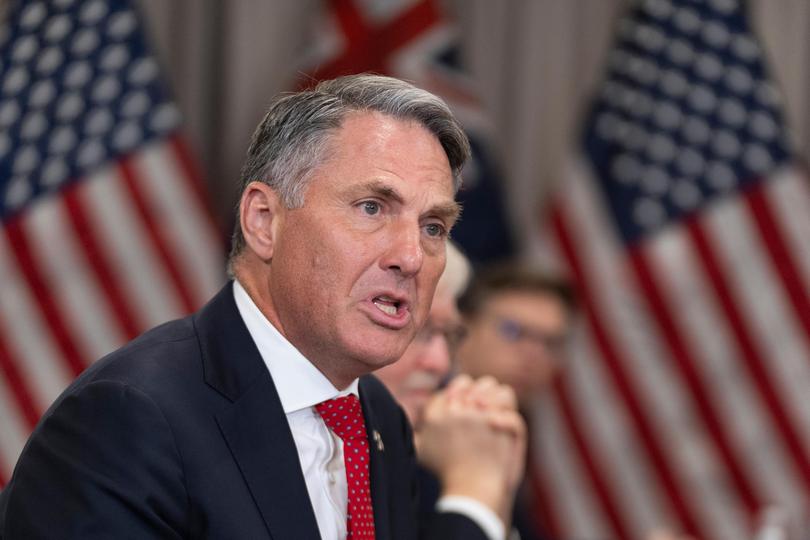LATIKA M BOURKE: Former UK Defence Secretary Grant Shapps says Australia needs to lift defence spending
EXCLUSIVE: The former UK Defence Secretary delivered the withering assessment in light of US President Donald Trump’s tariff-heavy approach to allies and like-minded countries.

Australia’s low spending on defence is partly to blame for Donald Trump’s war on foreign aid and threats to impose tariffs on friendly countries, says a former British defence secretary.
Asked by The Nightly what he made of Mr Trump’s threats to impose tariffs on allied and like-minded countries, Grant Shapps said the US President’s widespread assault on foreign aid and like-minded countries over trade was counterproductive.
Anthony Albanese spoke with Mr Trump overnight and secured his agreement to consider exempting Australia from newly imposed blanket 25 per cent tariffs on US steel imports.
Sign up to The Nightly's newsletters.
Get the first look at the digital newspaper, curated daily stories and breaking headlines delivered to your inbox.
By continuing you agree to our Terms and Privacy Policy.The federal government is hopeful that its trade deficit with the US, as well as its AUKUS partnership will see Australia granted the same reprieve former Coalition Prime Minister Malcolm Turnbull successfully sought during Mr Turmp’s first Presidency.
But business groups have repeatedly warned that Australia cannot afford to be complacent because of Mr Trump’s transactional, America First and unpredictable style, regardless of the alliance.
Mr Shapps, who lost his seat in the Conservative wipe-out at the last election, said while he did not agree with Mr Trump’s methods against America’s friends they were somewhat justified, particularly when it came to defence spending.
“Look, I’ll just put it out there because I’m not a politician and it doesn’t really matter and by the time, if I ever come back to politics, Trump will have left office because you can’t go again,” he said, speaking at an event for the London NGO Coalition for Prosperity, which builds cross-party support for foreign aid.
“So I’m going to say it … I’ll just tell you truth, I think Trump is wrong to break the Western coalition.
“I think that is wrong, I think that is counter-productive.
“I think it’s counterproductive for America as much as it is for Britain or any other country.
“But I do think he’s right that it’s wrong that Europe and other countries have been freeloading off America providing our protection for too many decades.
“Maybe it was okay after the Second World War when we were all broken.
“But it is inexcusable, that that we’re spending less than 2.5 per cent (on defence).”
And Mr Shapps said that during his visit to Australia last year for the Defence and Foreign Ministers’ talks, it was obvious to him that Australia also needed to lift its weight.
“And Australia who live in an increasingly dangerous part of the globe – I went and visited and very kindly went in an F-18, had a great time – but actually the Australian defence budget is also far too small for the threat that is on the horizon in the Indo-Pacific,” he said.
“So why should American taxpayers pay the money that we’re not prepared to pay ourselves?”
A spokeswoman for Deputy Prime Minister and Defence Minister Richard Marles said the government was boosting Australia’s defence spending to focus the force on upholding stability and security in the region.
“The budget papers show Defence spending has never been higher and the Albanese Government has set it on a trajectory to grow higher over the forward estimates and the decade. Defence spending on acquisition and sustainment is at record levels,” the spokeswoman said.
“Under this Government, we are investing $330 billion through the new Integrated Investment Program over the next 10 years to accelerate capabilities.
“This includes an additional $5.7 billion over the next four years and $50.3 billion over the next decade in Defence funding.
“This will see Defence funding as a proportion of GDP reach over 2.3 per cent by 2033-34 – more than 0.2 per cent higher than the spending trajectory set by the former Coalition government.
“We inherited a Defence budget in a mess.
“Since coming to Government, we have made record investments in Defence, we have bridged the capability gap and we will acquire conventionally armed, nuclear‑powered submarines a decade earlier than the timeframe we inherited.”
Mr Shapps made his comments before Mr Marles’ visit to the Pentagon on Friday to visit his US counterpart Pete Hegseth.

Australia has begun its first payments for the AUKUS submarines, sending the US a cheque for US$500 million in the past fortnight.
Since being re-elected, Mr Trump has begun demanding NATO allies pay 5 per cent of their GDP towards defence although there has been speculation that this is a bargaining tactic and would settle at around 3 per cent.
Michael Shoebridge, former deputy at two of Australia’s intelligence agencies – the Australian Signals Directorate and the Defence Intelligence Organisation – and now director of the Canberra-based think tank Strategic Analysis Australia, said Australia was unlikely to be in the Trump Administration’s cross-hairs, but that was no reason not to act.
“Donald Trump and his key people are working on a very broad front at speed,” he said.
“They have many higher priorities than Australia, which means we’re unlikely to be a focus - for good or ill.
“But the defence spending of NATO allies and other allies is one of Trump’s priorities (just like steel and aluminium tariffs are), so Australia can get caught in the wider net when Trump demands allies spend 3 per cent of GDP on defence as a minimum.
“All Richard Marles’ overblown rhetoric about historic levels of defence spending can’t hide the actual numbers: the Albanese Government is spending just under 2 per cent now and says that’s rising to 2.3 per cent over 10 years.
“That’s miles short of Trump’s benchmark.
“Even handing over $800m suitcases full of AUKUS cash doesn’t change that.”
John Blaxland, professor of International Security & Intelligence Studies at the ANU said Australia had been talking the talk but reluctant to walk the walk when it came to defence spending.
“Yes, 2 per cent of GDP is spent on defence, but that’s now looking a bit stale,” he said. =
“On one level the government’s reluctance to spend reflects the classic guns versus butter debate: We aren’t at war so why spend more on defence now when we can put it off in the hope that we have enough deterrent effect in place.
“That’s all fine, of course, until it isn’t. And the new Trump administration is looking around for laggards to target with tariffs and more.
“On another level, the government’s reluctance to spend more on defence right now reflects internal political difficulties: with many on the left highly critical of the AUKUS arrangements, the government has been reluctant to add to its domestic political owes by spending more.
“Yet in looking for the Goldilocks solution, where just enough is spent to satisfy alliance requirements and just enough is not spent to allay fears of a revolt from the ALP left, it may well be putting itself back into the US cross-hairs for not doing enough.
“Some political courage is called for. Make the decisions. Sign more contracts. Invest more in advanced research and development in the university sector and beyond.
“Make it more attractive to join and serve, and recruit more uniformed personnel.”

